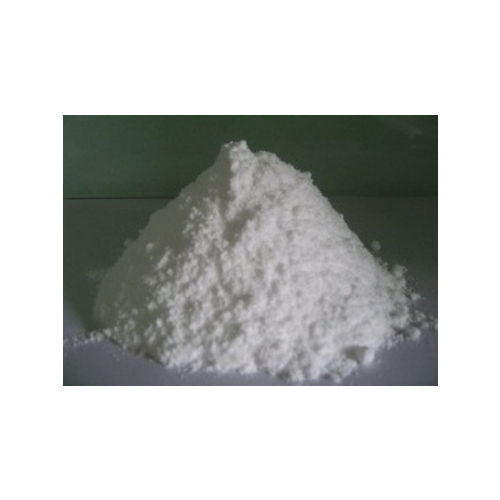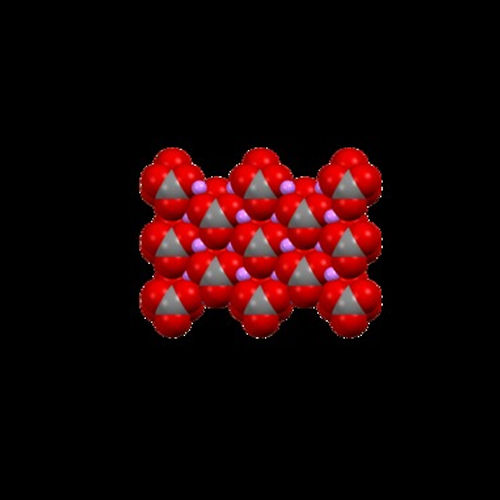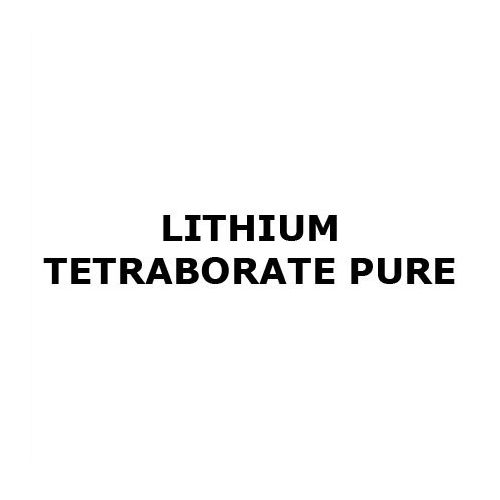
Lithium Iodide Anhydrous
Product Details:
- Form Powder,
- Melting Point 446 degree centigrade
- Molecular Formula 133.85
- Solubility Insoluble In Water
- Storage Room Temperature,
- Classification Organic Chemicals,
- CAS No 10377-51-2
- Click to view more
X
Lithium Iodide Anhydrous Price And Quantity
- 50 Gram
Lithium Iodide Anhydrous Product Specifications
- Powder
- 10377-51-2
- Lithium Iodide Anhydrous
- 133.85
- 446 degree centigrade
- Insoluble In Water
- Industrial Grade
- Organic Chemicals
- Industrial
- Room Temperature
Lithium Iodide Anhydrous Trade Information
- 50 Gram Per Month
- 2-12 Week
Product Description
Bestowed with five years of experience in this domain, we are renowned as prime entity engaged in manufacture and offering of Lithium Iodide Anhydrous. The offered chemical compound is extensively used in high temperature batteries as electrolyte. Processed under the strict vigilance of our experienced professionals using optimal quality basic materials this anhydrous is also tested on different parameters to ensure its purity. Further we offer this product to our clients in various packaging options at market leading prices.
Lithium Iodide Anhydrous Properties:
1. CAS Number: 10377-51-2
2. Formula: LiI
3. Molecular Weight: 133.85 g/mol
4. Density: 4076 g/cm3
5. Melting Point: 446 degree centigrade
6. Appearance: Crystalline solid
7. Color: White
8. Solubility: It is soluble in polar solvents such as water, ethanol, and acetone.
Lithium Iodide Anhydrous Applications:
1. Chemical Synthesis: Anhydrous lithium iodide serves as a catalyst or reagent in organic synthesis reactions. It can facilitate various transformations in organic chemistry, including halogenation reactions and carbon-carbon bond formations.
2. Lithium-Ion Batteries: While anhydrous lithium iodide itself is not directly used in lithium-ion batteries, it can be involved in the synthesis of electrolytes or other battery components. Lithium compounds are critical in battery technology, and anhydrous lithium iodide may play a role in improving battery performance and stability.
3. Pharmaceuticals: Anhydrous lithium iodide may have applications in pharmaceuticals, particularly in iodine-containing drugs where it can serve as a source of iodine or as a reactant in synthesis. It may also be used in pharmaceutical formulations requiring a stable lithium salt.
4. Nuclear Reactors: Anhydrous lithium iodide can be used in certain types of nuclear reactors as a coolant or as a neutron absorber. Its high solubility in water makes it suitable for these applications, where maintaining stable reactor conditions is crucial.
5. Optical Applications: Due to its transparency in the infrared range, anhydrous lithium iodide may find use in specialized optical devices or components. It can be employed in infrared spectroscopy or as a material for infrared windows and lenses.
6. Chemical Analysis: Anhydrous lithium iodide may be utilized in analytical chemistry techniques, such as in the preparation of specific solutions or as a reactant in certain analytical methods.
7. Ionic Conductors: Anhydrous lithium iodide exhibits high ionic conductivity, making it useful in solid-state batteries, fuel cells, and other electrochemical devices where efficient ion transport is essential.
8. Catalysis: Anhydrous lithium iodide can function as a Lewis acid catalyst in various chemical reactions, including organic transformations such as the synthesis of ethers and esters.
Lithium Iodide Anhydrous FAQ:
Q. What are the properties of anhydrous lithium iodide?
Ans: Anhydrous lithium iodide has properties such as high melting point (around 446 degree centigrade), solubility in polar solvents, hygroscopicity, high ionic conductivity, and reactivity with oxidizing agents.
Q. What are the applications of anhydrous lithium iodide?
Ans: Anhydrous lithium iodide finds applications in chemical synthesis as a catalyst or reagent, in lithium-ion batteries, pharmaceuticals, nuclear reactors, optics, and as an ionic conductor in electrochemical devices.
Q. How is anhydrous lithium iodide synthesized?
Ans: Anhydrous lithium iodide can be synthesized by reacting lithium hydroxide or lithium carbonate with hydroiodic acid or iodine.
Q. Is anhydrous lithium iodide hazardous?
Ans: Anhydrous lithium iodide can release toxic fumes of iodine and lithium oxide under certain conditions. It is also reactive with strong oxidizing agents. Proper handling and storage procedures should be followed.
Q. What precautions should be taken when handling anhydrous lithium iodide?
Ans: Protective equipment such as gloves and goggles should be worn when handling anhydrous lithium iodide. It should be stored in a dry environment to prevent moisture absorption.
Q. Can anhydrous lithium iodide be used in lithium-ion batteries?
Ans: While anhydrous lithium iodide itself is not directly used in lithium-ion batteries, it can be involved in the synthesis of electrolytes or other battery components.
Q. What are the optical properties of anhydrous lithium iodide?
Ans: Anhydrous lithium iodide has transparency in the infrared range, which makes it useful in certain optical applications.
Q. Can anhydrous lithium iodide be used in pharmaceuticals?
Ans: Anhydrous lithium iodide may have applications in pharmaceuticals, particularly in iodine-containing drugs where it can serve as a source of iodine or as a reactant in synthesis.
Q. Is anhydrous lithium iodide stable under normal conditions?
Ans: Anhydrous lithium iodide is relatively stable under normal conditions, but it may decompose upon heating or exposure to certain reactive chemicals.
Tell us about your requirement

Price:
Quantity
Select Unit
- 50
- 100
- 200
- 250
- 500
- 1000+
Additional detail
Mobile number
Email
Other Products in 'Lithium' category
 |
AXIOM CHEMICALS PVT. LTD
All Rights Reserved.(Terms of Use) Developed and Managed by Infocom Network Private Limited. |








